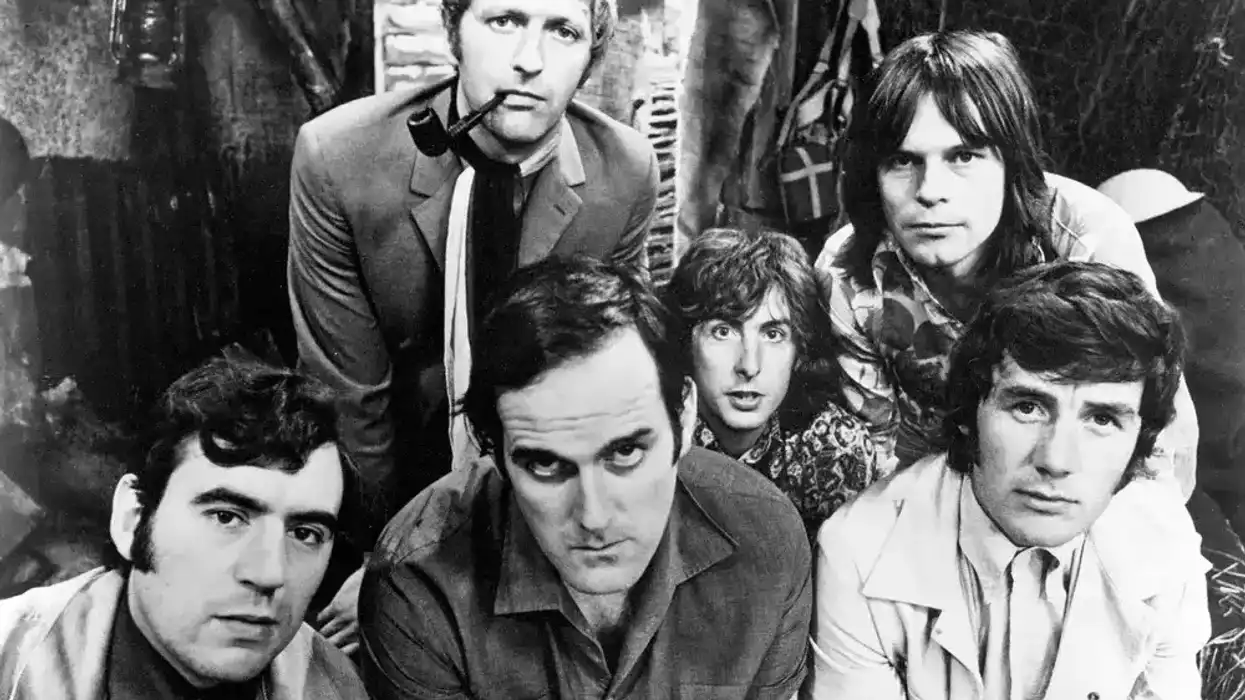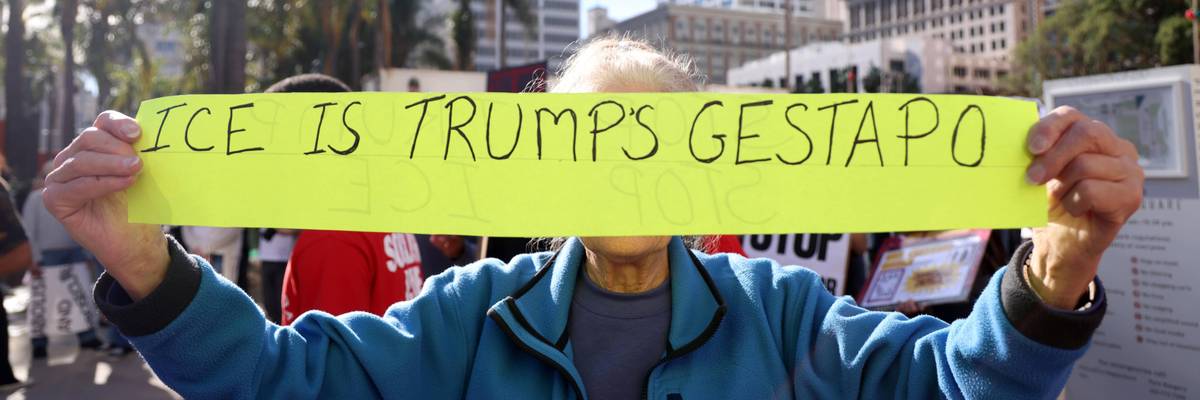Sabrina Haake
January 18, 2026

Federal agents stand guard in Minneapolis. REUTERS/Ryan Murphy
Before Renee Nicole Good’s body was cold, Donald Trump, Kristi Noem, and JD Vance grabbed the national spotlight to defame her (terrorist mows down federal agents!) while defending the goon who murdered her.
The masked ICE agent who shot Good at close range held his cellphone in one hand while firing his gun with the other, showing more interest in spectacle than fear. His video will be added to the Department of Homeland Security library of recordings to generate bloodlust among the type of recruits ICE seeks: Proud Boys, Oath Keepers, Three Percenters, pardoned J-6ers, and basement-dwelling incels craving skin on skin action of any kind.
Under Noem’s guidance, and on the American taxpayers’ considerable dime, DHS records high-resolution, highly-edited, "cinematic" style videos of their own brutality for recruitment propaganda. Like the midnight raid of a Chicago apartment building when DHS filmed a Black Hawk helicopter swooping in to terrify sleeping people with flash-bang grenades, most violence is staged, performative horror.
With the Supreme Court temporarily blocking Trump’s deployment of military forces into U.S. cities, ICE is stepping up, morphing into Trump’s Praetorian guard. A look at DHS’ recruitment materials makes clear that ICE isn’t targeting intelligent, law-respecting recruits, but a rabid ethnic cleansing force to serve Steve Miller’s white nationalist agenda.
Emotional appeals to racists
In ICE’s August recruitment push, DHS posted on X, “Which way, American man?” with signs on a deserted road pointing Uncle Sam to “Cultural Decline” and other destinations.
“Which way, American man” is a call for white nationalism, and was the title of William Gayley Simpson’s 1978 white nationalist, neo-Nazi book.
An online review shows DHS similarly misusing American iconography to recruit new agents, manipulating emotions with depictions of a fictitious, ‘happier’ time in America by turning homey Norman Rockwell-style graphics into sinister appeals for violence.
In September, DHS started using Rockwell’s images on Twitter, Facebook, and Instagram, starting with the 1946 Working on the Statue of Liberty. The image appears with ICE slogans, “Protect Your Homeland. Defend Your Culture,” and adds a racist dog whistle by Calvin Coolidge — “Those who do not want to be partakers of the American spirit ought not to settle in America” — along with a URL where people can sign up with ICE.
Rockwell’s family has asked federal agencies to stop using his work because DHS has “become infamous in recent months for its increasingly brutal and often illegal enforcement methods.” In early November, Rockwell’s family wrote an op-ed in USA Today complaining that the Trump messages behind the posts run so contrary to the artist’s personal beliefs that he would be “devastated” to see his art “marshaled for the cause of persecution toward immigrant communities and people of color.”
ICE.gov features job postings in which a Civil War era Uncle Sam points and intones, “America needs you. America has been invaded by criminals and predators. We need YOU to get them out.” Then, in smaller print, “You do not need an undergraduate degree.”
ICE’s YouTube site features video after video of Fox News “interviews” — propaganda — alongside professionally filmed fast-action shorts. One video, “Veterans Day Message,” is an interview with acting Director Todd Lyons conflating ICE agents with the military. Spliced with war-time footage, it shows fast action war scenes, paratroopers dropping from planes, armed troops descending from helicopters, and a war-gaming situation room.
Another, “Florida 287(g) with Collier County Sheriff Rambosk,” is accompanied by video game music and features an “Alligator Alcatraz” sign above swampland complete with live alligators waiting for prey.
Another, “Break the law. We regulate” appeals to directly to thugs. It opens showing six masked ICE officers pulling a man out of his car and shoving him to the ground, then segues to other arrests as a narrator says, “Regulators. We regulate the stealing of his property. We damn good too. But you can’t be any geek off the street. You gotta be good with the steal, you know what I mean, to earn your keep.”
Another features an Ohio sheriff in a ten gallon cowboy hat bragging about how many illegal aliens are in his jail, proclaiming, “Thank God that we have an administration, that we have ICE and President Trump actually doing what people want.”
This racist, political propaganda, illegally funded with federal tax dollars, obviously targets low-intellect applicants.
Minnesota fights back
Immediately after Good’s murder, the Trump regime doubled down, and sent 1000 more ICE agents into Minnesota, on top of an already unwanted 2,100 DHS and Border Patrol agents.
Trump officials know that increased ICE forces, now expanding without legal authority into traffic stops, elevate the threat to civilians. Since increased violence and civic unrest will hasten the day Trump declares martial law, escalation appears to be the goal.
St. Paul, Minneapolis, and the state of Minnesota are fighting back. On Monday, they filed suit, alleging that thousands of armed and masked DHS agents have stormed the Twin Cities to conduct militarized raids and carry out dangerous, illegal, and unconstitutional stops and arrests in sensitive public places, including schools and hospitals — all under the guise of lawful immigration enforcement.
This operation is driven by nothing more than the Trump administration’s desire to punish political opponents and score partisan points — at the direct expense of Plaintiffs’ residents. Defendants’ actions appear designed to provoke community outrage, sow fear, and inflict emotional distress, and they are interfering with the ability of state and local officials to protect and care for their residents….
Minnesota notes that state and city governments are bearing the costs of ICE’s civil rights violations. Government brutality, broad-scale and publicly excused by Trump’s spokespeople, “recklessly endangers the public safety, health, and welfare of all Minnesotans. Additionally, Defendants’ agents’ inflammatory and unlawful policing tactics provoke the protests the federal government seeks to suppress…”
Kristi Noem’s DHS podium is inscribed with “One of ours, all of yours,” the Nazi philosophy of collective punishment. By lore or fact, when one SS officer was killed in a Czech Village, the Nazis killed every resident of that village in retribution. Wildly disproportionate, lawless, ignorant, and brutal, the slogan complements ICE recruitment materials perfectly, and draws a map of where Trump’s ICE is heading.










